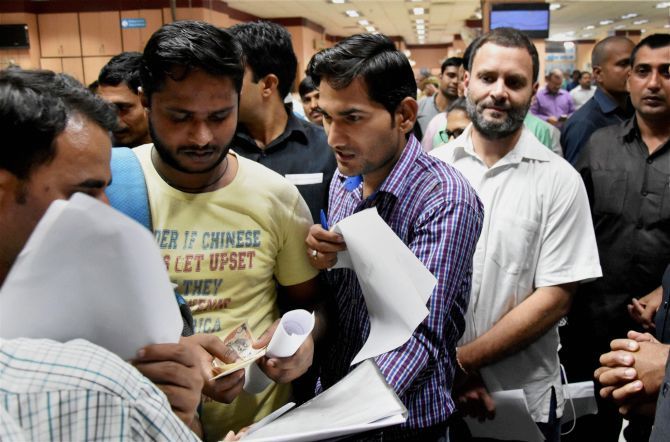Despite the indisputable facts demonetisation and its pain is yet to have a quantifiable political backlash.
But this is provided the government can limit the damage to the next one week.
Aditi Phadnis reports from New Delhi.

The chatter in the political classes is hushed, but paradoxically it is also deafening.
Many in Parliament have lost significant wealth as a result of demonetisation, but no estimates are available because there are no records.
A Nationalist Congress Party politician in Maharashtra, who was a senior minister in the last government, is reported to have been ruined. Most of his wealth is in cash in high-denomination notes.
Several Maharashtra builders who were close friends of a former chief minister and Union minister also from Maharashtra have lost everything.
In Tamil Nadu, where money flows like water during elections -- in the April 2016 assembly elections, more than Rs 100 crore (Rs 1 billion) in cash was seized by the Election Commission, the highest-ever in the history of independent India -- all political parties are curiously silent about the move.
Neither the ruling All India Anna Dravida Munnetra Kazhagam nor the Dravida Munnetra Kazhagam have said much.
M Karunanidhi, leader of the DMK, only said: 'Since it is being said that the move is to eliminate black money, we welcome it. But rather than the rich, only the ordinary, middle and poor people are affected.' This, in a state where cash is king.
Ramgopal Yadav of the Samajwadi Party said in his speech in Parliament: 'It is said that black money finds its way into election funding. But let me place on record, elections are not won or lost on the basis of spending money. If that were the case, the same party would keep winning elections. We win or lose on the basis of the opinions and mandate of the people.'
Really?
No one knows how much cash goes into keeping democracy alive and thriving in India.
Consider the reports after the Thirumangalam assembly by-election in Tamil Nadu in 2009. Anecdotal evidence has it that cash ranging from Rs 1,000 to Rs 5,000 was tucked into morning newspapers with small chits urging people to vote this way or that.
The ruling DMK's imprimatur was most visible, and it won by an astounding 39,000 votes, leading many to call it a 'buy' election.
Karunanidhi's elder son M K Azhagiri, who was at the time the DMK strongman in charge of the Madurai region and for him winning Thirumangalam was a matter of prestige, staunchly denied all innuendoes that cash was distributed to win the election.
But it is the oracle of our times, the WikiLeaks cables, accessed and published by The Hindu newspaper, that gave the game away.
The Hindu published a leaked cable containing a conversation between an official of the US consulate with one Patturajan, whose principal claim to fame was proximity to Azhagiri.
Patturajan is quoted to have told the official: 'It is no secret at all, Azhagiri paid Rs 5,000 per voter in Thirumangalam.'
The Tamil Nadu excise department reported a sudden, huge spike in liquor sales from that region.
Local media reported how in the week approaching the election butchers were suddenly inundated with customers who would give them Rs 1,000 currency notes, advising them expansively to run a tab. Everyone suddenly seemed to be rich overnight.
Little wonder then, that in the week demonetisation was the biggest political issue in Parliament and outside, all that Tamil Nadu parties were concerned about was the problems faced by fishermen.
The AIADMK successfully stalled proceedings in both Houses during Zero Hour, protesting against attacks on Tamil Nadu fishermen by the Sri Lankan army.
And, in the midst of all his preoccupations, Prime Minister Narendra Modi found time to meet a joint delegation of AIADMK MPs from both Houses of Parliament, which kept him for almost half an hour to apprise him of the contents of a four-page note about the fishermen’s travails.
Who's talking rollback
The Central Hall of Parliament is the hub of India's political mood.
For two days running, BJP MPs avoided extended discussions on demonetisation and its impact.
The first round of debates on November 16, when the Rajya Sabha put aside all other business to discuss the fallout of the decision, saw the government in an extraordinarily complaisant mood.
Bitter attacks on the government's insensitivity in general by the Opposition yielded no impassioned interventions from the Treasury benches, even direct criticism of the prime minister went undefended and unremarked by the BJP.
The government was quick to say that it was ready to have a full debate regardless of how long it took. It seemed to be on the defensive.
Interestingly, even before Mamata Banerjee mentioned the word rollback -- it was she and Arvind Kejriwal who were the first to demand the government roll back the decision -- BJP MPs began asking around if anyone had heard anything about a rollback, asserting staunchly that while there was no question of any such move, er... is anyone talking about it?”
If the ruling alliance was confused that there was more to it than just going after black money, so was the Opposition.
It took Congress Vice-President Rahul Gandhi nearly 12 hours to decide whether outlawing Rs 1,000 and Rs 500 currency notes was a good idea or a bad one.
Even after that, the Congress pointedly stayed away from street protests that were led by Banerjee and Kejriwal. None of its front organisations -- the NSUI, the Youth Congress or the Seva Dal -- came out to pointedly help people in long queues; instead Gandhi made the queues a little longer by opting to join them himself.
Patience running thin
November is the season of investor conferences in Delhi and Mumbai.
An investor from a European fund could not believe what he was seeing: Long patient queues of people waiting to withdraw their own money.
While the frustration and irritation with the government is evident across the country, almost everybody says in the same breath with ill-suppressed glee that it is the rich who must be suffering much more.
There are many critics of the Modi government and a few of Modi himself.
The irony is that while those who had very little to start with have even less now, the target of their ire is the bank employee rather than the finance ministry.
Despite indisputable facts -- like the rows of trucks carrying perishable goods like vegetables and fruit paralysed for lack of acceptable currency notes, or the speed with which rumours like a shortage of salt spread, or construction labourers having to do with just one meal a day because of delays in payment -- demonetisation and its pain is yet to have a quantifiable political backlash.
But this is provided the government can limit the damage to the next one week. After that, the damage will begin to show.












 © 2025
© 2025